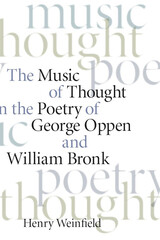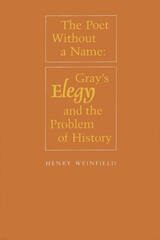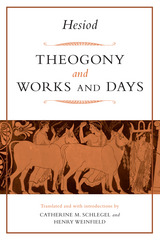3 books by Weinfield, Henry

The Music of Thought in the Poetry of George Oppen and William Bronk
Henry Weinfield
University of Iowa Press, 2009
George Oppen (1908–1984), born into a prosperous German Jewish family, began his career as a protégé of Ezra Pound and a member of the Objectivist circle of poets; he eventually broke with Pound and became a member of the Communist party before returning to poetry more than twenty-five years later. William Bronk (1918–1999), by contrast, a descendant of the first European families in New York, was influenced by the works of Shakespeare, the King James Bible, and the work of the New England writers of the American Renaissance. Despite differences in background and orientation, the two men formed a deep friendship and shared a similar existential outlook. As Henry Weinfield demonstrates in this searching and original study, Oppen and Bronk are extraordinary thinkers in poetry who struggled with central questions of meaning and value and whose thought acquires the resonance of music in their work. These major writers created poetry of enduring value that has exerted an increasing influence on younger generations of poets.
From his careful readings of Oppen’s and Bronk’s poetry to his fascinating examination of the letters they exchanged, Weinfield provides important aesthetic, epistemological, and historical insights into their poetry and poetic careers. In bringing together for the first time the work of two of the most important poets of the postwar generation, The Music of Thought not only illuminates their poetry but also raises important questions about American literary history and the categories in terms of which it has generally been interpreted.
From his careful readings of Oppen’s and Bronk’s poetry to his fascinating examination of the letters they exchanged, Weinfield provides important aesthetic, epistemological, and historical insights into their poetry and poetic careers. In bringing together for the first time the work of two of the most important poets of the postwar generation, The Music of Thought not only illuminates their poetry but also raises important questions about American literary history and the categories in terms of which it has generally been interpreted.
[more]

The Poet Without a Name
Gray's Elegy and the Problem of History
Henry Weinfield
Southern Illinois University Press, 1991
Henry Weinfield offers a new reading not only of the Elegy itself but also of its place in English literary history. His central argument is that in Gray’s Elegy the thematic constellation of poverty, anonymity, alienation, and unfulfilled potential—or what Weinfield calls the "problem of history"—is fully articulated for the first time, and that, as a result, the Elegy represents an important turning-point in the history of English poetry.
[more]

Theogony and Works and Days
Hesiod
University of Michigan Press, 2006
Written in the late eighth century BC by Hesiod, one of the oldest known of Greek poets, Theogony and Works and Days represent the earliest account of the origin of the Greek gods, and an invaluable compendium of advice for leading a moral life, both offering unique insights into archaic Greek society. There are a number of modern translations of Hesiod available, rendered in serviceable English, but until now no one has created a work of literature equal to the original. This translation is the result of a unique collaboration between a classicist and a poet, capturing in English fourteeners the works’ true poetic flavor while remaining faithful to the Greek text and the archaic world in which it was composed.
This translation contains a general introduction, a translator’s introduction, notes, and a glossary. It will be of interest to general readers, students of and specialists in classical literature, and lovers of poetry.
"This Schlegel-Weinfield translation of Hesiod is superbly crafted: compelling, unforgettable poetry to be read aloud with delight and gratitude."
—Allen Mandelbaum, Endowed Kenan Professor of Humanities, Wake Forest University
"This exciting and unique collaboration between a classical philologist and a poet will not just provide insight into archaic Greek society, but also offer something new: the opportunity to experience the richness of Hesiod's style, language, and modes of thought with remarkable fidelity to the ancient Greek. Weinfield and Schlegel make Hesiod sing."
—Carole Newlands, Classics Department, University of Wisconsin
"Schlegel and Weinfield have produced one of the most remarkable of a current resurgence of translations from the classics, allowing the modern world to hear a poet who may have known Homer. Hesiod’s song makes us understand why the Greeks thought a poet could draw dolphins through the seas or raise the walls of Thebes. Weinfield translates by ear and transfers what he hears to the page, resonant fourteeners, a worthy echo of the past."
"This Schlegel-Weinfield translation of Hesiod is superbly crafted: compelling, unforgettable poetry to be read aloud with delight and gratitude."
—Allen Mandelbaum, Endowed Kenan Professor of Humanities, Wake Forest University
"This exciting and unique collaboration between a classical philologist and a poet will not just provide insight into archaic Greek society, but also offer something new: the opportunity to experience the richness of Hesiod's style, language, and modes of thought with remarkable fidelity to the ancient Greek. Weinfield and Schlegel make Hesiod sing."
—Carole Newlands, Classics Department, University of Wisconsin
"Schlegel and Weinfield have produced one of the most remarkable of a current resurgence of translations from the classics, allowing the modern world to hear a poet who may have known Homer. Hesiod’s song makes us understand why the Greeks thought a poet could draw dolphins through the seas or raise the walls of Thebes. Weinfield translates by ear and transfers what he hears to the page, resonant fourteeners, a worthy echo of the past."
—Charles Stanley Ross, Professor, Department of English, and Director, Comparative Literature, PurdueUniversity
Catherine Schlegel is Associate Professor of Classics, University of Notre Dame. Henry Weinfield is Professor and Chair of Liberal Studies, University of Notre Dame, and translator of The Collected Poems of Stephane Mallarme.
Catherine Schlegel is Associate Professor of Classics, University of Notre Dame. Henry Weinfield is Professor and Chair of Liberal Studies, University of Notre Dame, and translator of The Collected Poems of Stephane Mallarme.
[more]
READERS
Browse our collection.
PUBLISHERS
See BiblioVault's publisher services.
STUDENT SERVICES
Files for college accessibility offices.
UChicago Accessibility Resources
home | accessibility | search | about | contact us
BiblioVault ® 2001 - 2024
The University of Chicago Press









